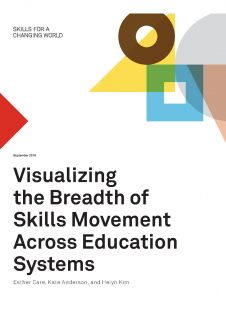 20-09-2016, Brookings | There is a global movement happening in education. Around the world education systems are increasingly inclusive of a broad range of skills in curricula to prepare students for the complex challenges of this century. As with change more generally, transformation in education happens in different ways and at different rates. As part of the Skills for a Changing World project, this global mapping study seeks to explore this movement and identify how national education goals and policies reflect changing perspectives on the ways to equip students with the skills needed for the 21st century – including literacy and numeracy but going well beyond these competencies to include skills such as collaboration, problem solving, and creativity.
20-09-2016, Brookings | There is a global movement happening in education. Around the world education systems are increasingly inclusive of a broad range of skills in curricula to prepare students for the complex challenges of this century. As with change more generally, transformation in education happens in different ways and at different rates. As part of the Skills for a Changing World project, this global mapping study seeks to explore this movement and identify how national education goals and policies reflect changing perspectives on the ways to equip students with the skills needed for the 21st century – including literacy and numeracy but going well beyond these competencies to include skills such as collaboration, problem solving, and creativity.
Our study looked at how countries translate their commitment to breadth of skills, noted by aspirational statements into the specific skills they value and approaches to curriculum. We mapped four categories of criteria for selected countries – skills mentioned in mission and vision statements, specific skills identified in any documents, skills present in curriculum, and whether a skills progression is notified.
Report Visualizing the Breadth of Skills Movement Across Education Systems
A global movement to include a broad range of competencies or ‘breadth of skills,’ beyond literacy and numeracy, is increasingly visible and evident in national education policies and curricula. The breadth of skills movement manifested at an international level within Sustainable Development Goal 4[1] to ensure inclusive and quality education for all and promote lifelong learning. An outcome of decades of national education reforms, this agreement identifies literacy and numeracy skills, skills for employment and entrepreneurship, and skills needed to promote sustainable development as targets for all children and youth by 2030.
While many countries have adopted a breadth of skills approach in their policies, the degree to which the skills movement is reflected at all levels of education systems varies across countries. Visualizing the breadth of skills movement is one focus of Skills for a Changing World,[2] a project at the Center for Universal Education at the Brookings Institution. An initial scan of 102 countries investigates the degree to which breadth of skills is reflected in education systems, from a high level within vision or mission statements to inclusion within curriculums. This scan sought evidence of skills beyond traditional academic skills of literacy and numeracy. From this initial scan, several findings emerged:
• The majority of countries acknowledge the importance of breadth of skills somewhere in their public documents, and many list a number of specific skills or competencies that the education system intends to provide.
• Only a few countries show evidence that these skills are consistently identified in national documents, including mission and vision statements, curriculum frameworks, and descriptions of how skills progress for learners.
• Communication, creativity, critical thinking, and problem solving are the 21st century skills most frequently identified by countries.
These findings show that the skills movement has been underway for some time, at least in national rhetoric. There is less evidence of its articulation in curriculum and pedagogy policies, which may mean it is less evident in classrooms as well. Given probable early stages in implementation, there is clear potential for countries to assist each other in developing approaches to integration of a broad set of competencies within education provision.
Visit the website to download the report
Interactive map
Explore the map of a global movement. Help us complete this study by sharing any missing information.
Skills for a Changing World
Skills for a Changing World is a project of the Center for Universal Education at Brookings and the LEGO Foundation that seeks to ensure all children have high-quality learning opportunities that build the breadth of skills needed to create a productive, healthy society in the face of changing social, technological, and economic demands.
